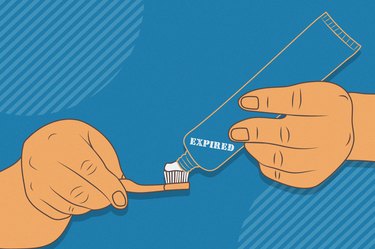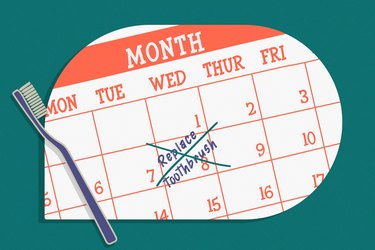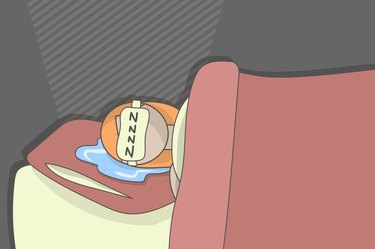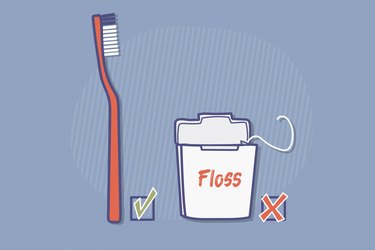
When it comes to checking expiration dates, you are likely to check food items like milk or eggs. But did you know that toothpaste also has an expiration date?
The whole point of using toothpaste is to keep your teeth healthy and prevent cavities. So, you might wonder what happens if you brush with an expired tube.
Video of the Day
Video of the Day
Here, Marina Gonchar, DMD, founder of Skin to Smile, shares whether it's safe to brush with expired toothpaste, the possible downsides for your dental health and how to ensure a proper clean, even if your tube runs out.
So, Does Toothpaste Really Expire?
Yep, toothpaste can go bad. That's because it has several active ingredients like fluoride, a naturally occurring mineral that's extremely important in preventing cavities, Dr. Gonchar says. And over time, fluoride degrades and becomes less effective, she explains.
The expiration date reflects the freshness of the fluoride.
So, how long is toothpaste good for? "Toothpaste usually has a two-year shelf-life" from its manufacturing date, Dr. Gonchar says. You can find the date printed on the packaging or tube.
3 Possible Drawbacks of Using Expired Toothpaste
Choosing to brush with old toothpaste isn't optimal for your oral health. Here's why:
1. It Puts You at a Greater Risk for Cavities
As mentioned, "one of the active ingredients in toothpaste, fluoride, becomes significantly less active after its expiration," Dr. Gonchar says. That can spell problems for your pearly whites as "fluoride's main action is to prevent cavity formation," she says.
Fluoride strengthens your enamel (aka, the outer surface of your teeth), making it better protected against acid attacks that trigger tooth decay, according to the American Dental Association (ADA).
Once it's past its expiration date, fluoride becomes less effective at doing its job, raising your risk of developing cavities, Dr. Gonchar says.
2. It May Harbor Microorganisms
After toothpaste expires, it can start growing fungi and bacteria, Dr. Gonchar says. (Eww.) Beside being gross, these microbes may also meddle with your mouth.
"These species of fungi and bacteria are often not native to your oral cavity and their introduction can disrupt your oral flora, leading to increased risk of cavity formation and gingival [or gum] inflammation," Dr. Gonchar explains.
3. It Can Negatively Affect Your Overall Brushing Experience
Most of us love the fresh feeling that comes with clean teeth. Unfortunately, an old tube of toothpaste can dampen this pleasant experience. While not harmful per se, certain ingredients in toothpaste tend to lose their quality over time — ruining its minty fresh taste.
For example, "[some] ingredients may become separated, or the texture will become inconsistent. The paste may also become dried out," Dr. Gonchar says.
Is It OK to Use Expired Toothpaste in an Emergency?
Brushing with expired toothpaste is certainly not ideal, but it's also not the worst-case scenario.
While you "can continue to use toothpaste for several months without decreased effectiveness, using toothpaste that has expired for several years is not recommended," Dr. Gonchar says. That's because, "all the unwanted effects typically don't take place immediately after expiration," she adds.
In other words, using old paste in a pinch won't harm your teeth as long as it's not a year or more past its expiration date. If the expiration date on the tube is past a year, toss it in the trash.
Believe it or not, "it's best to just brush with water until you can replenish your supply," Dr. Gonchar says. While toothpaste is crucial for healthy teeth, "mechanical removal of plaque and debris, [through the friction and movement of] brushing and flossing, is by far the most effective way to prevent cavities," she says. Brushing with baking soda can also help.
That is, your toothbrush's bristles do the heavy lifting as far as removing and dislodging any food or plaque, which stick to your teeth and can trigger tooth decay. Still, toothpaste boasts a bunch of benefits for your mouth, so don't stop using it entirely.
So, How Bad Is It Really to Use Expired Toothpaste?
Bottom line: Brushing with old toothpaste probably won't hurt you, but its decreased effectiveness also won't help you maintain a healthy mouth. So, stay up-to-date on your dental products (and routine professional cleanings) and purchase a fresh tube of toothpaste, stat.
Is this an emergency? If you are experiencing serious medical symptoms, please see the National Library of Medicine’s list of signs you need emergency medical attention or call 911.






